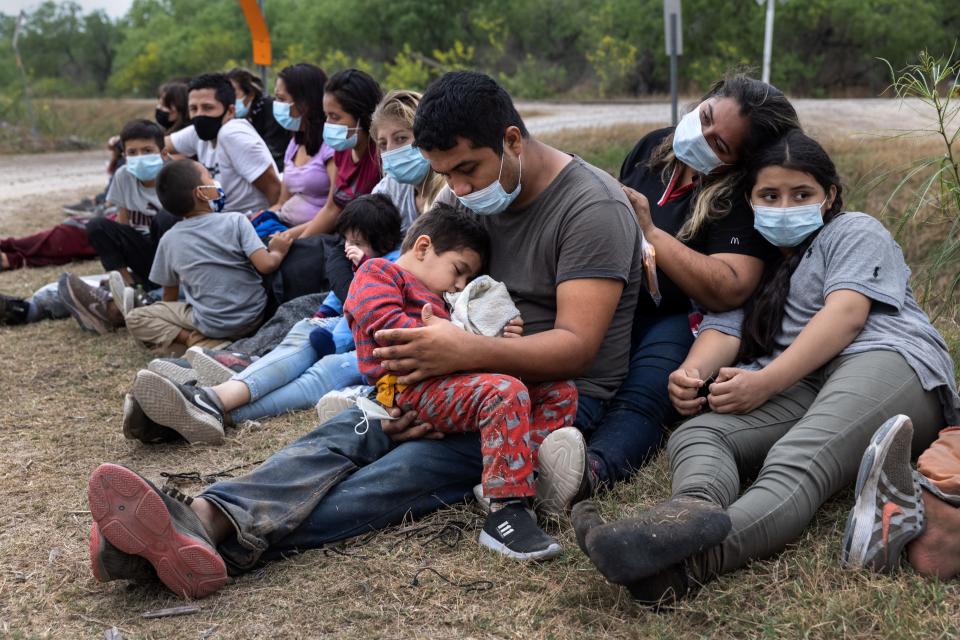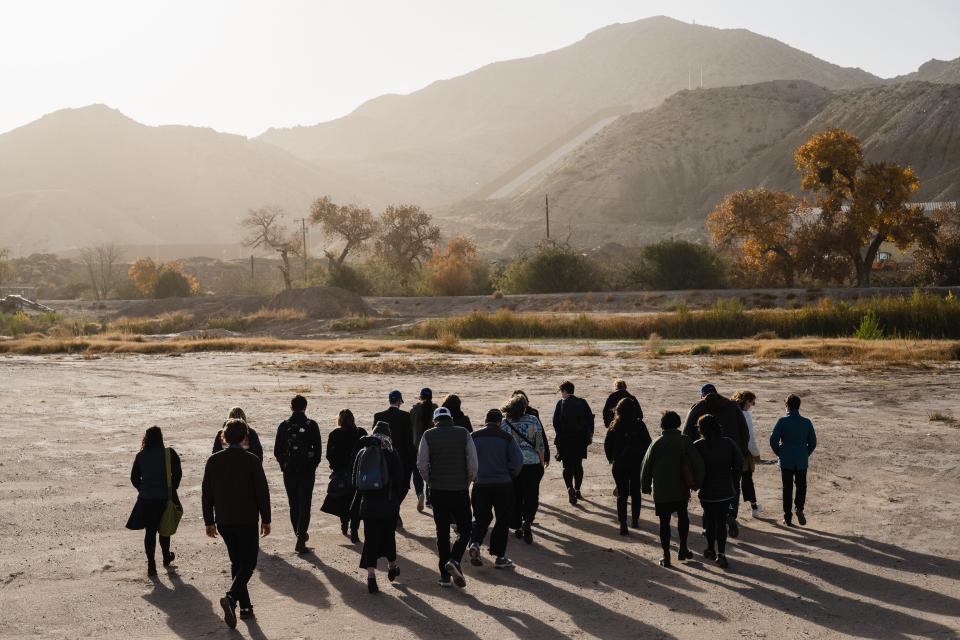Opinion: Detained immigrants desperate for help in Michigan — and Biden policies to blame
- Oops!Something went wrong.Please try again later.
At the Michigan Immigrants Rights Center, our phones ring nonstop with calls from people from around the world desperately seeking freedom, safety and family reunification. Our nonprofit law office hears from mothers, fathers ― persecuted people ― because we are the only free call for legal help from anyone held in immigration detention in our state.
Lately, we've taken a number of calls from folks brought up from the southwest border to the Calhoun County Jail. That's one of four Michigan counties — along with Monroe, St. Clair and Chippewa — that U.S. Immigration and Customs Enforcement contracts to house asylum seekers detained at the southern border.

They are there for no reason other than that they came to the border between the U.S. and Mexico and exercised their clear legal right to apply for asylum. Most of the people jailed in these Michigan counties have cleared the first legal standard in this process, establishing that their lives are in danger in their home countries. Despite that asylum seekers are in civil, not criminal, detention in these county jails, there is no special accommodation; they live in the same conditions as other inmates.
If you think that this country's immigration policy has changed since 2020 — because the Trump Administration is over — or if you believe that the "Biden Border" is open, you don't have the whole story.
Bad policy, stacked on a crumbling foundation
The course the Biden Administration is charting closely tracks numerous anti-asylum proposals, designed by notoriously anti-immigration Trump aide Stephen Miller, that were advanced for the first time during the Trump Administration. Those proposals rest atop the crumbling foundations of an immigration system that serves neither immigrants nor the country, nor our local communities. We could do much better, and all benefit, but we fail to recognize the full humanity of people who move. We fail to understand migration as a natural, normal, inevitable part of the human condition.

Several damaging Trump Administration policies that the Biden Administration is clinging to, including the "transit ban" — requiring migrants to seek asylum in a country they travel through — have already been found to be illegal.
The “Title 42” policy — expelling asylum seekers, without process, under cover of COVID-19 precautions — is a longstanding misuse of a public health regulation. But it has become a security blanket for anti-migration leaders who otherwise insist that the pandemic is over. (Only the proposed end of the COVID-19 emergency declaration by the Biden Administration seems like it might be able to possibly end this practice in the near future.)
Migration is not a problem to be solved
Whenever I publicly express any degree of positive regard for asylum seekers, I'm told I'm naive, despite more than 20 years in direct relationship with those seeking our nation's protection, and moving to Michigan. Roman Catholic Bishop Mark J. Seitz of the Diocese of El Paso knows asylum seekers well, too. Seitz wondered aloud to the Associated Press, "Why do we tend to look at (asylum seekers) and say, 'I think they're probably criminals' instead of to look at them and say 'I think they're probably people in need'?"
I would answer Bishop Seitz’s question by saying that it’s because many are so unwilling to see ourselves in “them.” Michigan’s leaders fret about population loss in key demographic categories, but very few think of appealing to those seeking freedom and safety. The burden of what others imagine about asylum seekers might be the heaviest one they bear.
Instead of regarding the phenomenon of migration as a natural, inevitable, and even beautiful part of human existence, we’re told that it’s a problem to be solved. Any policy that doesn’t end or sharply restrict migration “once and for all” is not considered a good one.
But that's not how we gauge other policies. We don’t assume that the local food pantry is a failure, even though no matter how much food it distributes, humans still need to eat every single day.

No matter what the current administration does to emulate the approach of the last, immigration restrictionists have shown they will still cry foul. Maybe it's time for this administration to give up on trying to get this dubious credit from anti-immigrant groups — and try fully respecting human rights, international law, and our own Refugee Act of 1980.
Seeing ourselves in others
It has been 36 years since the last immigration reform bill passed. If we all saw ourselves in those who migrate, we would respond pragmatically to changing global conditions. But even popular, practical, and bipartisan targeted immigration bills like the DREAM Act, Farm Workforce Modernization Act, and Afghan Adjustment Act failed to move to the president’s desk in the last lame duck session in Congress. Their future in the 118th Congress looks even dimmer.
The Trump Administration is over, but the ordinary, everyday harm we are collectively still doing to immigrants and refugees continues. Locally, as of December 2022, 10,198 Michigan immigrants are in deportation proceedings at the Detroit Immigration Court — more than ever before.
People of goodwill were eager to support our legal work on behalf of children and families during the high profile "family separation" human rights crisis in 2018. Many wrongly assume that the pressures we face as a legal resource center for immigrant communities have waned.

As much as we wish that were the case, the phone is still ringing. But our encounter with the people on the other end of that line gives us hope, as do the person-by-person wins we can achieve as lawyers and legal workers for immigrants and refugees.
Our one-year-old Detroit Immigration Court Helpdesk program is seeing some self-represented immigrants finally winning their asylum cases, with our support, and at long last starting new lives. At the state level, undocumented and other immigrant leaders are organizing to regain access to driver’s licenses and state identification through the Drive Michigan Forward coalition.
Other high priorities for immigrant communities at the state level include increased support for language access,, assistance with naturalization, and equal workplace rights for immigrants including equal access to the worker’s compensation system. We tend to our community needs and find joy in the ways individuals and families can flourish.
The rhetoric of resentment and fear, though cruel and wasteful, can’t shatter that strength.
Susan Reed is the attorney director of the Michigan Immigrant Rights Center.
This article originally appeared on Detroit Free Press: Biden administration clinging to ‘damaging’ Trump immigration policies

